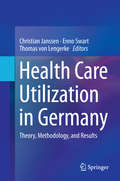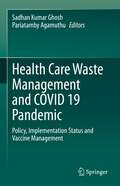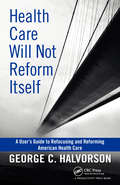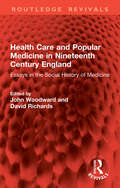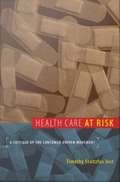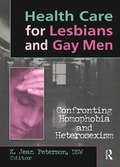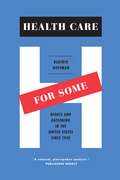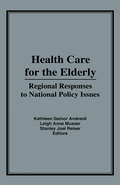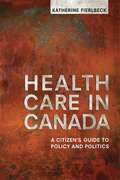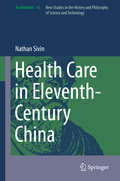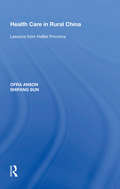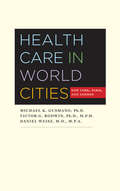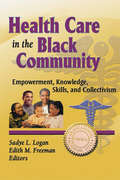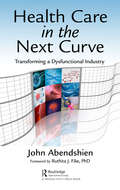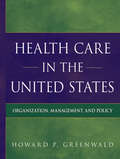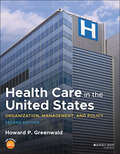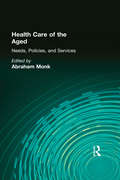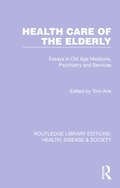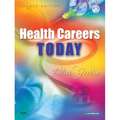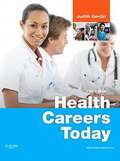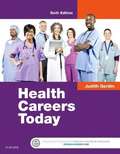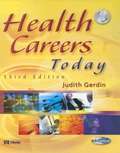- Table View
- List View
Health Care Utilization in Germany
by Christian Janssen Enno Swart Thomas Von LengerkeIt is a societal given, borne out by the facts: the higher one's social status, the better health, and the longer life expectancy. As the situation persists, an important question demands attention, namely whether health care systems contribute to the inequity. Drawing accurate conclusions requires workable theory, reliable data collection instruments, and valid analytical methods. Using one representative country to typify the industrial world, Health Care Utilization in Germany studies its subject in terms of social determinants. This singular volume offers systematic guidelines for research into health care access based on an acclaimed behavioral model of care utilization. Contributors focus on specific social factors, medical conditions, and sectors of care to examine why differences exist, their implications, and how care providers can better match supply with demand. And many of the book's topics, such as obesity, dementia, preventive services, and immigrant health, are of global interest. Included in the coverage: Updating a classic behavioral model of health care access. Insights from qualitative research. The problem of repeated surveys: how comparable are their results? Gender and utilization of health care. Care utilization by dementia patients living at home. Social determinants of utilization of psychotherapy in Germany. A volume certain to spark discussion among researchers across the community, the findings and methods in Health Care Utilization in Germany will be analyzed by health psychologists, public health professionals, and epidemiologists.
Health Care Waste Management and COVID 19 Pandemic: Policy, Implementation Status and Vaccine Management
by Pariatamby Agamuthu Sadhan Kumar GhoshThis book deals with the general principles, policy instruments, sustainability of supply chain, and business of health-care waste (HCW) management including inputs on exercise in immune health defense against COVID 19. Health-care waste management is very important in any country for protection of environmental and animal and human health. The COVID-19 pandemic, in addition, has augmented this importance to a greater extent. Italy has been successful in curbing the problems related to HCW management during the COVID-19 pandemic at very fast rates from the worst situation, while for a few countries in Asia and Africa, challenges still exist. It is necessary that policy makers, researchers, and implementers gain more knowledge and information on these aspects and improve the strategies and actions. Addressing these issues will reduce the cost of health care as well as resource inefficiency hindering sustainable development goals. This book is of interest and useful to practitioners, capacity builders and policy makers, entrepreneurs, NGOs, and general people, and is a valuable source of reference to the relevant researchers and students in global markets. The book serves as a reading material for undergraduate and graduate students of environmental science, waste management, and medical science. National and international scientists as well as policy makers will also find this to be a useful read.
Health Care Will Not Reform Itself: A User's Guide to Refocusing and Reforming American Health Care
by George C. HalvorsonHealth care reform is within our reach. According to George Halvorson, CEO of the nation's largest private health care plan, only by improving the intent, quality, and reach of services will we achieve a health system that is economically feasible into the future. &nb
Health Care and EU Law
by Erika Szyszczak Markus Krajewski Johan Willem Gronden Ulla NeergaardThe aim of the present volume is to explore the consequences of the impact of the EU rules for the internal market (including the proposed Directive on patients' rights) and competition on national health care systems. It will also address how related areas, such as EU public procurement law and WTO law, influence national healthcare organisation and Member State autonomy.
Health Care and EU Law (Legal Issues of Services of General Interest)
by Erika Szyszczak Markus Krajewski Ulla Neergaard Johan Willem van de GrondenThe EU has only limited competence to regulate national health-care systems but recent developments have shown that health care is not immune from the effects of EU law. As Member States have increasingly experimented with new forms of funding and the delivery of health-care and social welfare services, health-care issues have not escaped scrutiny from the EU internal market and from competition and procurement rules. The market-oriented EU rules now affect these national experiments as patients and health-care providers turn to EU law to assert certain rights. The recent debates on the (draft) Directive on Patients’ Rights further underline the importance, but also the difficulty (and controversy), of allowing EU law to regulate health care.The topicality of the range of issues related to health care and EU law was addressed, in October 2009, at a conference held in Nijmegen, The Netherlands. The present volume contains inter alia the proceedings of this conference and invited essays. This volume follows the publication of The Changing Legal Framework for Services of General Interest in Europe. Between Competition and Solidarity (Krajewski M et al (eds) (2009) T.M.C. Asser Press, The Hague) and launches a new series: Legal Issues of Services of General Interest. The aim of the series is to sketch the framework for services of general interest in the EU and to explore the issues raised by developments related to these services.The book is compulsory reading for everyone who is engaged in issues relating to health care and EU law.Johan van de Gronden is Professor of European Law at the Law Faculty of the Radboud University Nijmegen, the Netherlands. Erika Szyszczak is a Jean Monnet Professor of European Law ad personam and Professor of European Competition and Labour Law at the University of Leicester, UK. Ulla Neergaard is Professor of EU law at the Law Faculty of the University of Copenhagen, Denmark. Markus Krajewski is Professor of International Public Law, Faculty of Law, University of Erlangen-Nuremberg, Germany.
Health Care and Popular Medicine in Nineteenth Century England: Essays in the Social History of Medicine (Routledge Revivals)
by John Woodward David RichardsOriginally published in 1977, this book presents a selection of work by historians and sociologists on medicine and society in the 19th century. It concentrates on practitioners and patients, quackery and folk medicine, as elements in the social, cultural, political and economic structure of the community at large. The relevance of social history in medicine to the analysis of the role of medicine in society is discussed as well as the knowledge of sex and sexuality and the professionalisation of medicine.
Health Care at Risk: A Critique of the Consumer-Driven Movement
by Timothy Stoltzfus JostIn Health Care at Risk Timothy Stoltzfus Jost, a leading expert in health law, weighs in on consumer-driven health care (CDHC), which many policymakers and analysts are promoting as the answer to the severe access, cost, and quality problems afflicting the American health care system. The idea behind CDHC is simple: consumers should be encouraged to save for medical care with health savings accounts, rely on these accounts to cover routine medical expenses, and turn to insurance only to cover catastrophic medical events. Advocates of consumer-driven health care believe that if consumers are spending their own money on medical care, they will purchase only services with real value to them. Jost contends that supporters of CDHC rely on oversimplified ideas about health care, health care systems, economics, and human nature. In this concise, straightforward analysis, Jost challenges the historical and theoretical assumptions on which the consumer-driven health care movement is based and reexamines the empirical evidence that it claims as support. He traces the histories of both private health insurance in the United States and the CDHC movement. The idea animating the drive for consumer-driven health care is that the fundamental problem with the American health care system is what economists call "moral hazard," the risk that consumers overuse services for which they do not bear the cost. Jost reveals moral hazard as an inadequate explanation of the complex problems plaguing the American health care system, and he points to troubling legal and ethical issues raised by CDHC. He describes how other countries have achieved universal access to high-quality health care at lower cost, without relying extensively on cost sharing, and he concludes with a proposal for how the United States might do the same, incorporating aspects of CDHC while recognizing its limitations.
Health Care for Lesbians and Gay Men: Confronting Homophobia and Heterosexism
by K Jean PetersonHealth Care for Lesbians and Gay Men educates practitioners about the special needs of gay and lesbian patients and how to look critically at the impact of homophobia and heterosexism on the provision of care. It provides an overview of critical health care issues for lesbians and gay men and offers concrete suggestions to health practitioners and social workers on how to address these issues in order to guarantee the best care for their patients and clients. Authors in Health Care for Lesbians and Gay Men give health care providers and mental health workers practical interventions; suggestions for advocacy, social change, grassroots efforts, and alternative programs; and lessons about how to use existing procedures to more effectively meet the unique health care needs of gays and lesbians. Practitioners also learn how to utilize legal action in securing and protecting patients’and clients’personal health care wishes. Chapters in this book cover: how homophobia and negative attitudes can directly compromise the care given to lesbians and gay men. heterosexism and biases which exclude the partners of gay men and lesbians from participating in the care of their loved ones. legal issues and the need for legal recognition of gay and lesbian relationships, both to enhance the provision of care and for financial access to health care presently available to only heterosexual, married couples. legal protection and special legal documents that ensure that the wishes of gay men and lesbians are honored and the integrity of their relationships not violated.Health Care for Lesbians and Gay Men starts with special issues confronting adolescents and the special role health care providers can play in supporting the struggles of lesbian and gay adolescents. It then continues to look at these issues over the life cycle. Three themes emerge as authors try to explain problems and possible solutions for lesbians and gay men seeking health care: the pervasive homophobia and heterosexism found throughout the health care system and the impact these attitudes and beliefs have on the health care of lesbians and gay men; the need for education in professional programs on special health issues of gay men and lesbians; and the critical role that social workers can play in both educating others about the special needs of their gay and lesbian clients and in advocating for their clients in various health care settings.Health Care for Lesbians and Gay Men is essential reading for social work and social service practitioners and students working in the health care field, advanced undergraduates and graduate students of social work, professionals and students of nursing and medicine, and others concerned with the quality and equality of health care services. It urges students and professionals to challenge and evaluate their own attitudes, beliefs, and behaviors in order to ensure quality services to all clients and patients.
Health Care for Some: Rights and Rationing in the United States Since 1930
by Beatrix HoffmanIn Health Care for Some, Beatrix Hoffman offers an engaging and in-depth look at America's long tradition of unequal access to health care. She argues that two main features have characterized the US health system: a refusal to adopt a right to care and a particularly American approach to the rationing of care. Health Care for Some shows that the haphazard way the US system allocates medical services--using income, race, region, insurance coverage, and many other factors--is a disorganized, illogical, and powerful form of rationing. And unlike rationing in most countries, which is intended to keep costs down, rationing in the United States has actually led to increased costs, resulting in the most expensive health care system in the world. While most histories of US health care emphasize failed policy reforms, Health Care for Some looks at the system from the ground up in order to examine how rationing is experienced by ordinary Americans and how experiences of rationing have led to claims for a right to health care. By taking this approach, Hoffman puts a much-needed human face on a topic that is too often dominated by talking heads.
Health Care for the Elderly: Regional Responses for National Policy Issues
by Faan Mph Stanley Joel Reiser Kathleen Gainor Andreoli Dsn Leigh Anne MusserLeading experts in health policy, gerontology, economics, and ethics explore the potential impact of the growing number of elderly on our health care system. They provide valuable information on the continuing debate over national health care policy for the elderly versus a more decentralized.
Health Care in America: A History
by John C. BurnhamA comprehensive history of sickness, health, and medicine in America from Colonial times to the present.In Health Care in America, historian John C. Burnham describes changes over four centuries of medicine and public health in America. Beginning with seventeenth-century concerns over personal and neighborhood illnesses, Burnham concludes with the arrival of a new epoch in American medicine and health care at the turn of the twenty-first century.From the 1600s through the 1990s, Americans turned to a variety of healers, practices, and institutions in their efforts to prevent and survive epidemics of smallpox, yellow fever, cholera, influenza, polio, and AIDS. Health care workers in all periods attended births and deaths and cared for people who had injuries, disabilities, and chronic diseases.Drawing on primary sources, classic scholarship, and a vast body of recent literature in the history of medicine and public health, Burnham finds that traditional healing, care, and medicine dominated the United States until the late nineteenth century, when antiseptic/aseptic surgery and germ theory initiated an intellectual, social, and technical transformation. He divides the age of modern medicine into several eras: physiological medicine (1910s–1930s), antibiotics (1930s–1950s), technology (1950s–1960s), environmental medicine (1970s–1980s), and, beginning around 1990, genetic medicine. The cumulating developments in each era led to today's radically altered doctor-patient relationship and the insistent questions that swirl around the financial cost of health care.Burnham's sweeping narrative makes sense of medical practice, medical research, and human frailties and foibles, opening the door to a new understanding of our current concerns.
Health Care in Canada
by Katherine FierlbeckHealth Care in Canada examines the challenges faced by the Canadian health care system, a subject of much public debate. In this book Katherine Fierlbeck provides an in-depth discussion of how health care decisions are shaped by politics and why there is so much disagreement over how to fix the system.Many Canadians point to health care as a source of national pride; others are highly critical of the system's shortcomings and call for major reform. Yet meaningful debate cannot occur without an understanding of how the system actually operates. In this overview, Fierlbeck outlines the basic framework of the health care system with reference to specific areas such as administration and governance, public health, human resources, drugs and drug policy, and mental health. She also discusses alternative models in other countries such as Britain, the United States, and France. As health care becomes increasingly complex, it is crucial that Canadians have a solid grasp of the main issues within both the policy and political environments. With its balanced and accessible assessment of the main political and theoretical debates, Health Care in Canada is an essential guide for anyone with a stake in Canada's health system.
Health Care in Eleventh-Century China
by Nathan SivinBy examining all the prevalent varieties of therapy from self-care to religious ritual, this book explores health care practices in China, before modern times. In ancient China most people were unable to afford a doctor, even in the unlikely case that one lived near their village and was willing to treat peasants. What did they do when their children got sick? The answer is to be found in this book, which goes far beyond the history of medicine. The author uses methods of medical anthropology to explain the curative roles of popular religion, Daoism, Buddhism and the therapeutic rites performed by imperial officials. Readers will discover the steady interaction of religious healing and classical medicine in this culture. This highly readable book builds on over forty years of study and analysis of early liturgical and medical writings and a wide variety of other sources. Its focus on the eleventh century throws new light on a period of rapid transition in many aspects of therapy and it will appeal to scholars and general readers alike.
Health Care in Rural China: Lessons from HeBei Province
by Ofra Anson Shifang SunThis work examines health, defined in its broadest meaning, in rural China today. It explores the current social distribution of health status, health behaviour and health care and the processes by which these came about. By exploring universal questions in the social, historical and political context of rural China, the authors advance our understanding of the social processes which shape the social distribution of health and health care, and draw policy implications for both post-industrial and developing societies. Using rural China as a case study, three main issues are addressed: � The role of ideology, politics and economic processes in shaping access to health and health care for the rural population; � The behaviour patterns of lay persons and health professionals and the degree to which they are influenced by specific social context; � Patterns of health inequalities and the distribution of health services. The book will be a useful reference for students, researchers and policy makers with an interest in health care in developing as well as post-industrial societies.
Health Care in World Cities: New York, Paris, and London
by Michael K. Gusmano Victor G. Rodwin Daniel WeiszNew York. London. Paris. Although these cities have similar sociodemographic characteristics, including income inequalities and ethnic diversity, they have vastly different health systems and services. This book compares the three and considers lessons that can be applied to current and future debates about urban health care. Highlighting the importance of a national policy for city health systems, the authors use well-established indicators and comparable data sources to shed light on urban health policy and practice. Their detailed comparison of the three city health systems and the national policy regimes in which they function provides information about access to health care in the developed world’s largest cities. The authors first review the current literature on comparative analysis of health systems and offer a brief overview of the public health infrastructure in each city. Later chapters illustrate how timely and appropriate disease prevention, primary care, and specialty health care services can help cities control such problems as premature mortality and heart disease. In providing empirical comparisons of access to care in these three health systems, the authors refute inaccurate claims about health care outside of the United States.
Health Care in the Black Community: Empowerment, Knowledge, Skills, and Collectivism
by Sadye Logan Edith M. FreemanEmpower patients with culture-specific strategies for promoting health, treating disease, and preventing violence!Current reports show that Black Americans have the highest death rate of all racial and ethnic groups. They suffer disproportionately from a number of fatal diseases, including hypertension, diabetes, and certain cancers. Moreover, violence takes far too high a toll, especially among young Black men. Clearly a different approach to health education and promotion is needed to end this tragic waste of valuable human lives. Health Care in the Black Community: Empowerment, Knowledge, Skills, and Collectivism proposes an innovative model for health professionals working in the Black community.Traditional Western medicine focuses on sickness, the isolated individual, and the material world. However, the Afrocentric values of many Black people emphasize wellness, the community, and the spiritual world. By basing health care approaches on the community's positive values of holistic healing and mutual assistance, Health Care in the Black Community suggests practical, effective strategies for promoting physical and emotional wellness. This comprehensive and informative book offers a solid intellectual framework as well as practical advice. Health Care in the Black Community: identifies deeply held African-American cultural traditions and attitudes offers specific suggestions for combining health care priorities with respect for cultural concerns shows how to gain compliance by involving patients in their own care and drawing on community strengths discusses the impact of specific problems such as low self-esteem, infertility, HIV/AIDS, and violence on Black families develops strategies for preventing family violence by helping family members define and identify emotions shares programs and ideas for enhancing the physical and mental health of elderly Black people identifies ways to overcome the drawbacks of early parenthoodHealth Care in the Black Community offers health care professionals-- policymakers, practitioners, researchers, and educators in the fields of social work, health care, and cultural studies--successful methods, models, and suggestions to help improve health care in Black communities.
Health Care in the Next Curve: Transforming a Dysfunctional Industry
by John AbendshienHealthcare in the U.S. is a critical juncture. We face a sharp upward rise in the number of people with chronic diseases and disabilities. As demands on our current health system grow, so will costs. But as a society we are approaching the upper limit of how much we are willing (or able) to spend on health care. Health care policy makers know this. That is why major health reform measures are focused on population health and value-based care. These are the so-called second curve objectives. But these initiatives are doomed to failure. We are asking a system to do things that it was not designed to do. In fact, we don’t have a health care "system" as such. We have a parts bin of disconnected silos. Fragmented delivery systems. Specialized caregivers. Professional groups. Trade associations. All with distinct cultures. Each with their own motivations and agendas. Our payer and regulatory structures have evolved over the decades in response to political and policy initiatives. However well intentioned (or not), these structures defy logic. They reward and reinforce counter-productive industry behaviors. They pose formidable roadblocks to achieving needed changes. Current reform initiatives are an implicit recognition that our health model is flawed. The attitude seems to be, "Yes, we know the overall health system is a problem, but we can make failure less severe if we implement these measures." We are at a critical juncture. We can continue to place additional demands on an industry model that has outlived its functional utility. Or we can take more of a clean slate approach and move toward a model that is in keeping with today’s needs. The outlook is not good if we stay on the current curve. The demands on resources will continue their upward trajectory. The default scenario will be one of rationing and less to invest in new cures and new technologies. The good news is that we are within sight of a future state of health care that can really work. In this future state, we have gotten rid of the artificial barriers to effective and efficient patient care. Physicians and other health professionals work in a coordinated, inter-disciplinary fashion. They have accountability for the whole care cycle. Caregivers have both the flexibility and encouragement to innovate and come up with optimal delivery approaches. And because they are in a risk-reward relationship with payers, they have the incentives to provide true value. Patients feel intimately connected to a system that is focused on their specific needs. The key to this future state is good old-fashioned market discipline. Other delivery models must either improve or get out of the way. The market will demand cost-efficiencies and won’t tolerate waste. Much of our regulatory structure will be rendered unnecessary. There will be not rewards for poor performance. This book takes a unique macro-level perspective of clinical, economic, and regulatory problems and possible solutions. It takes an objective and something scathing look at current industry structure: a silo-driven culture and entrenchment that is driven by self-interest; as well as the complicity of government in preserving the status quo through regulations, licensure, payment systems, etc.
Health Care in the United States
by Greenwald Howard PHealth Care in the United States combines an explanation of population health with a comprehensive introduction to health services delivery. The author, an expert on health care policy and management, shows how the U. S. health services system is organized, managed, financed, and evaluated. Filled with numerous examples and tables, this important resource illustrates key concepts, trends, and features of the system. It places special emphasis on recent health care reform legislation and its implications for the future. Health Care in the United States reviews the historical origins of health care, its resource requirements, costs, quality, and contributions to both individual and social well-being. By combining basic concepts in population health with coverage of health services, the book offers extraordinary breadth of information in a highly accessible, easy-to-read text. Along with an in-depth look at the origins and possible impact of recent health reform legislation, the book explains the ongoing dilemmas that face the health care system and highlights health and disease in the modern world, the fundamentals of epidemiology, and health behavior. Health Care in the United States also explains the special challenges of managing health service personnel and organizations. The author reviews key innovations in financing and delivery, explaining the outcomes of cost sharing, HMO enrollment, and rationing of services. This vital resource is written for students and professionals in health care management and policy, as well as public health, medical sociology, medical anthropology, social work, political science, and most, if not all, clinical fields.
Health Care in the United States: Organization, Management, and Policy
by Howard P. GreenwaldA one-stop resource covering American health care and the challenges it faces In the newly revised Second Edition of Health Care in the United States: Organization, Management, and Policy, distinguished health and organizational researcher Dr. Howard P. Greenwald delivers a comprehensive exploration of the US health care system and the challenges its practitioners, professionals, and consumers face. From organization to management, financing, and evaluation, this book discusses the critical concepts, trends, and features of this sprawling set of interlocking systems. It also examines the historical origins of modern health care and how it delivers services to over 300 million Americans. Readers will discover: Modern controversies in American health care that animate political debate and discussion, including the Affordable Care Act. Discussions of the health care labor force, as well as its history, background, and crucial challenges. Possible future directions for US health care, including preventive medicine, new policy initiatives, and proposals for reform. Written for students and professionals working in or studying health care management, health policy, public health, medical sociology, or anthropology, social work, or political science, this latest edition of Health Care in the United States is also a fascinating read for members of the general public curious about one of the most important services they'll ever interact with.
Health Care of the Aged: Needs, Policies, and Services
by Abraham MonkFocusing on the need for developing new service delivery models for the aged, Health Care of the Aged examines fiscal, political, and social criteria influencing this challenge of the 1990s. The aged are caught in the sweeping changes currently occuring in the financing, organizing, and delivery of human and health care services. From various perspectives, this new book will help shape the direction for elderly health care program development and implementation. With an emphasis on greater long-term care in either home, community, or institutional settings, this important book will increase the understanding for a comprehensive, effective policy designed to carry the growing number of elderly through this decade and into the next. As roles and issues change, this valuable book will become increasingly important to those involved in providing services and care to the elderly. Health care administrators, policymakers, social workers, physical and occupational therapists, and caregivers will benefit from the expertise presented in Health Care of the Aged.
Health Care of the Elderly: Essays in Old Age Medicine, Psychiatry and Services (Routledge Library Editions: Health, Disease and Society #1)
by Tom ArieOriginally published in 1981 and edited by a pioneer in psychogeriatric services, this book spans medicine, psychiatry, social work and organisation of services of the elderly, written by eminent authors from several different professions. Chapters include those on stroke rehabilitation, dementia, neurosis, psychotherapy for the elderly and institutional care, among others. The book discusses many issues which remain as pertinent today as when it was first published, not least the problems of providing health services for ageing populations.
Health Careers Today
by Judith GerdinCovering more than 45 health careers, this book offers a practical overview to help students make an informed decision in choosing a profession. Not only does it discuss the roles and responsibilities of various occupations, it provides a solid foundation in the skills needed for all health careers. Clear explanations of anatomy and physiology provide essential knowledge of health related to the human body, and show how this applies to different careers. Content in the book now adheres to and reflects National Health Care Skills Standards. A clear writing style makes it easy for students to explore health career options. Health career discussions include the requirements and roles and responsibilities of each. Full-color drawings and photographs illustrate concepts, techniques, and equipment. Summaries of essential points introduce new concepts and help with exam preparation. Anatomy and Physiology unit covers all of the body systems, and applies A&P to practice. Skill Activities provide the opportunity to obtain hands-on experience. Learning Objectives at the beginning of each chapter help readers focus on key information. Key Terms with definitions are listed at the beginning of each chapter. Core concepts are reinforced with more than 70 content boxes, skill boxes, review questions, and critical thinking questions. A comprehensive glossary includes all key terms and definitions for quick reference. The companion CD-ROM has been completely revised, now including over 20 all-new skills videos, animations, chapter-specific quizzes, and an audio glossary. NEW Culture and Health Care chapter provides information on cultural and religious diversity as required by the National Health Care Skills Standards (NHCSS), including strategies that various cultures use to solve health-related problems, clients and patients who use English as a second language, and the awareness of religious diversity as it relates to client care. NEW Standards and Accountabilities section appears at the end of appropriate chapters, with the specific number and name of each national standard covered, along with its page number, so that correlations can be found quickly and easily. Revised Interpersonal Dynamics and Communication chapter now includes information on team-building, goal-setting, evaluation, and traits of leaders and team members. NEW chapter summaries review and identify vital content covered in each chapter. Seven new skills have been added, offering additional hands-on experience.
Health Careers Today
by Judith GerdinDescribing more than 45 health careers, Health Careers Today, 5th Edition offers a practical overview to help you make an informed decision in choosing a profession. Not only does it discuss the roles and responsibilities of various occupations, it provides a solid foundation in the skills needed for all health careers. Clear explanations of anatomy and physiology provide essential knowledge of health related to the human body, and show how this applies to different careers. A companion Evolve website includes skills videos, animations, quizzes, and flashcards. Written by experienced educator Judith Gerdin, this book reflects National Health Care Skills Standards. A clear, easy-to-read approach makes it easy to explore health career options. Over 45 health careers are discussed, including the requirements and roles and responsibilities of each. Full-color drawings and photographs illustrate concepts, techniques, and equipment. The National Health Care Skills Standards are incorporated, and the book's organization closely follows the standards. An Anatomy and Physiology unit covers all of the body systems, and applies A&P to various career settings. Skill Activities provide the opportunity to obtain hands-on experience. Learning Objectives at the beginning of each chapter focus on key information. Key Terms with definitions are listed at the beginning of each chapter. Core concepts are reinforced with more than 70 content boxes, skill boxes, review questions, and critical thinking questions. National Standard sections summarize the specific number and name of each national standard covered in that chapter, along with page references. Chapter summaries make it easy to review and identify key content. A comprehensive glossary includes all key terms and definitions for quick reference. Student resources on a companion Evolve website include fill-in-the-blank and drag-and-drop quizzes, flashcards, anatomy and physiology animations, skill videos, an audio glossary, and web links. A workbook corresponds to the chapters in the textbook, and features learning activities such as vocabulary practice exercises, medical abbreviation practice exercises, coloring/labeling activities, concept application exercises, laboratory exercises, critical thinking exercises, and Internet activities. Sold separately. Updated and expanded content covers the electronic medical record, HIPAA, examples of career ladders in various health professions, superbugs and MRSA, cultural diversity, autism, BMI and its relationship to obesity, infection control, basic methods of cleaning and sterilizing instruments, HOSA guidelines, and all NHCSS (National Health Care Skills Standards) required information. Bios and photographs feature working professionals in many health careers, adding personal stories that you can relate to. Brain bytes reinforce concepts and keep you engaged in the material. New photographs show workers in various health care settings. References to websites connect you to online resources and research. Full-page forms are located in the appendix, with printable versions available on the companion Evolve website for use in assignments.
Health Careers Today
by Judith GerdinFind the health career that s right for you! Health Careers Today, 6th Edition offers a practical overview to help you make an informed decision in choosing a profession. Not only does this book discuss the roles and responsibilities of various occupations, it provides a solid foundation in the skills that each health career requires. Clear explanations of anatomy and physiology provide essential knowledge of the human body and show how A&P applies to different careers. From experienced educator Judith Gerdin, this edition adds three new chapters, and an Evolve companion website includes new health career videos, animations, exercises, and more. A clear, easy-to-read approach makes it easy to explore and understand health career options.Over 45 health careers are discussed, including the requirements and roles and responsibilities of each.Full-color photographs, drawings, and design illustrate concepts, techniques, and equipment."Anatomy and Physiology" unit covers all of the body systems, and applies A&P to various career settings."Skill Activities" provide the opportunity to obtain hands-on experience.Review" q"uestions and critical thinking questions in each chapter allow you to test your understanding of what you ve learned."Brain Bytes" reinforce concepts and keep you engaged in the material."Health Careers in Practice" boxes show working professionals in many health careers, featuring personal stories that you can relate to.Objectives and Key Terms at the beginning of each chapter focus on the key information to be learned.Chapter summaries make it easy to identify and review key content.Updated National Health Care Skills Standards are summarized with the specific number and name of each national standard covered in that chapter, along with page references.A glossary includes all key terms and definitions for quick reference.Evolve website provides exercises, new career videos, animations, and competency skill sheets for further information, review, and practice.A workbook corresponds to the chapters in the textbook, and features learning activities such as vocabulary practice exercises, medical abbreviation practice exercises, coloring/labeling activities, concept application exercises, laboratory exercises, critical thinking exercises, and online activities. "Sold separately. "NEW! Three new chapters on professionalism, medical mathematics, and medical terminology provide a firm foundation in health care basics.NEW CPR guidelines meet the 2015 guidelines for performing cardiopulmonary resuscitation.NEW! Employment strategies have been added to emphasize the skills necessary for retaining a job.NEW! Updated and expanded EHR information reflects the increased role of the electronic health record in health care.NEW! Expanded "Culture and Health" Care chapter prepares you to care for patients from other cultures and to address cultural differences safely and tactfully.NEW! Coverage of informatics and technology addresses this growing health care career.NEW! Career videos on the Evolve companion website showcase professionals discussing their health care career choices. "
Health Careers Today (3rd Edition)
by Judith GerdinThis valuable guide provides an introduction to the basic health care environment and a preview of various popular health careers designed to help students make informed choices based on their interest and their commitment to the educational and professional responsibilities of each health career. It gives students a realistic glimpse of various health careers available today, outlining the roles and responsibilities, levels of education and credentialing, daily functions, and key disorders and assessment tools that are involved.
